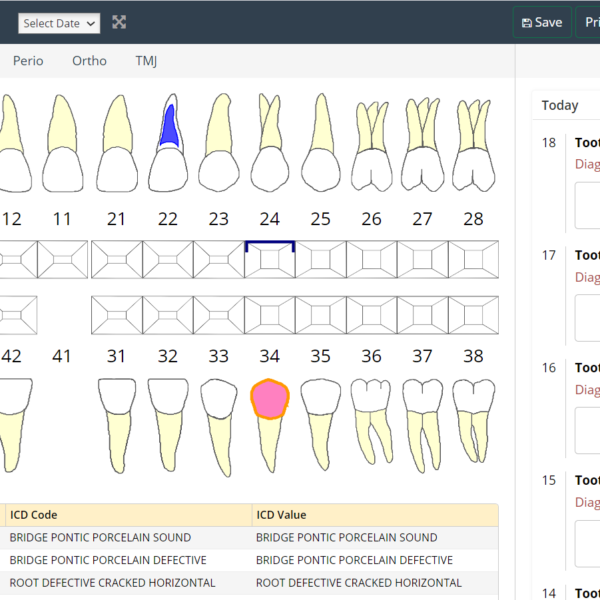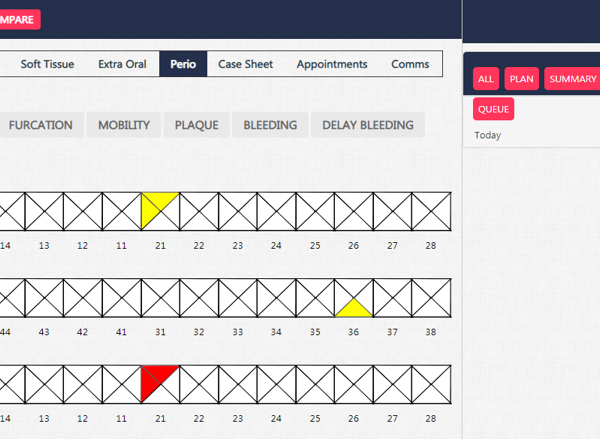CloudPital #1 Dental Software in Saudi Arabia provides the needed administrative and clinical operational support specific to dental practices. It is similar to other medical office management suites, offering elements such as patient management electronic dental health records and clinical management. It can be cloud based or locally installed, but most vendors are moving towards cloud based solutions
CloudPital #1 Dental Software in Saudi Arabia

Security considerations for Dental Software in Saudi Arabia to avoid data breach during Covid-19
A data breach is an incident in which confidential information is accessed without authorization. Your patient records contain sensitive information that is attractive to criminals, which is why cyber thieves target electronic data collected by the healthcare industry. Cybercrime in healthcare is particularly profitable. The average cost of a data breach incurred by a non-healthcare related agency, per stolen record, is $158. For healthcare agencies and Dentist System in Saudi Arabia the cost is an average of $355. Credit card information and personally identifiable information (PII) sell for $1-$2 on the black market, but protected health information (PHI) can sell for as much as $363. According to Symantec, electronic PHI was the most common form of data lost to data breaches in 2016, with personal consumer financial information close behind.
WHY ARE MEDICAL PRACTICES AT SUCH A HIGH RISK?
PHI is valuable because criminals can use it to target victims with scams that take advantage of the victim’s medical conditions or victim settlements. It can be used to create fake insurance claims, or to illegally gain access to prescriptions for use or resale. Hackers seek personal information to either steal money, compromise identity from Dental EMR Software in Saudi Arabia to steal money, or sell to other criminals on the dark web.
Because a ransomware-type cyber attack could compromise patient safety and care, health care organizations are more likely to pay the ransom. Newer ransomware is capable of deleting your backup from Dental Software in Saudi Arabia before destroying your data. Smaller practices may be at highest risk: after installing new technology to handle electronic health records (EHR), many smaller practices may lack the finances to stay ahead of hackers in terms of security.
HOW COMMON ARE SECURITY BREACHES IN HEALTHCARE?
Studies indicate that around 83% of physicians have been victims of cyber criminals. In May 2017 a global ransomware outbreak called WannaCry infiltrated several major organizations Britain’s National Health Services. Your entire Dental Software in Saudi Arabia is at risk, including peripheral devices, phones, tablets, etc.
It is incredibly important that all of your practice protocols and systems, including your health information technology (HIT), maintain HIPAA compliance. Your health information technology should have all the proper safeguards in place to ensure the security of your patients’ data. A HIPAA-compliant network will be password-protected and have antivirus and anti-malware software installed and used consistently for Dental Software in Saudi Arabia. As with printed PHI, staff should be properly trained in HIPAA-compliant practices for handling information technology. Also remember that every staff member does not require an equal level of access to patients’ PHI.
HOW DO DATA BREACHES OCCUR?
Some ways hackers gain access to a network are by:
Exploiting system vulnerabilities:
If you do not keep your software up-to-date on each of your computers and peripheral equipment, you could leave an entry point to your network.
Breaking weak passwords: Weak user passwords are easier for hackers to guess. Experts advise that you use complex, unique passwords that do not contain personal information. They also recommend that you change your passwords often and don’t use the same password for multiple applications.
Drive-by downloads:
You or a staff member could unintentionally download a virus or malware by simply visiting a compromised web page or opening an link on a spam email. A drive-by download will typically take advantage of a browser, application, or operating system that is out of date or has a security flaw.
Targeted malware attacks:
Cyber attackers use spam and phishing email tactics to try to trick the user into revealing user credentials of Dental Software in Saudi Arabia, downloading malware attachments, or directing users to vulnerable websites. Email is a common way for malware to end up on your computer. You and your staff should avoid opening any links or attachments in an email from an unfamiliar source. Remember that attackers can make an email look like it comes from a trusted source. Clicking on a link or attachment in an infected email could infect your computer with malware.
Installing ransomware:
This type of malware works by encrypting user files, then demands a fee of either $300 or $600 worth of bitcoins to release the encrypted data back to the owner.
A large portion (48%) of data breaches with Dental Software in Saudi Arabia are not caused by cyber criminals. They are caused by system glitches and human error.
Click to Start Whatsapp Chatbot with Sales
Mobile: +966547315697
Email: sales@bilytica.com
hospital HIMS software in Saudi Arabia
hospital ERP Software in Saudi Arabia
E-Clinic SOftware in Saudi Arabia
Dental Software in Saudi Arabia
EMR software in Saudi Arabia



